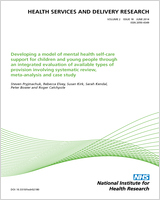NCBI Bookshelf. A service of the National Library of Medicine, National Institutes of Health.
Turner A, Mulla A, Booth A, et al. The international knowledge base for new care models relevant to primary care-led integrated models: a realist synthesis. Southampton (UK): NIHR Journals Library; 2018 Jun. (Health Services and Delivery Research, No. 6.25.)

The international knowledge base for new care models relevant to primary care-led integrated models: a realist synthesis.
Show detailsProject advisory group: terms of reference
Aims and objectives of the project
The project is led by The Strategy Unit, NHS Midlands and Lancashire Commission Support Unit together with the School of Health and Related Research (ScHARR) University of Sheffield. Funded by the NIHR HSDR programme (project reference number 15/77/15), the project is concerned with combining existing knowledge of what works in integrated care with the intentions of the MCPs in developing innovative new care models. It is expected that this work will help MCPs to improve their models.
The aim of this synthesis is to provide decision-makers in health and social care with a practical evidence base relating to the MCP model of care. The synthesis, based on realist principles, will develop a ‘blueprint’, which articulates how and why MCP models work, to inform design of future iterations of the MCP model.61
Specifically, the objectives of the synthesis are to:61
- articulate the underlying programme theories behind the MCP model of care, by mapping the logic models of the MCP demonstrator sites, prioritising key theories for investigation
- identify sources of theoretical, empirical and practice evidence to test the programme theories
- appraise, extract and analyse evidence, reconciling confirmatory and contradictory evidence
- develop the synthesis, producing a ‘blueprint’ to explain how the mechanisms used in different contexts contribute to outcomes and process variables
- consult with key stakeholders from selected MCP demonstrator sites to validate findings and to test applicability to different contexts
- finalise the synthesis, incorporating stakeholder feedback
- disseminate the findings, preparing a series of practical tools to support knowledge mobilisation.
Terms of reference of the advisory group
This group has been established to provide the project with independent support and advice. Its objectives are to:
- provide stakeholder perspectives on the scope of the synthesis and on emerging findings
- inform the study design, including input into the search strategy
- participate in strategic decisions about the project
- advise on key policy, strategy and communication activities which may inform or impact this project
- advise on the identification of key audiences and networks for dissemination activity
- advise on dissemination formats, routes and activities
- advise on interpretation of findings, to ensure relevance to stakeholders
- support the translation of findings into actionable recommendations and tools for local health economies.
Membership
Members have been assembled to provide a range of experience and expertise, including New Care Model vanguard sites, NHSE, senior leaders in health and social care, public representation, academic partners and collaborators, communications expertise and project team members (Table 11).
TABLE 11
Advisory group members
Working methods
It is expected that the advisory group will be convened on up to four occasions during the project, at the following key stages:
- at the project start, to confirm the scope of the synthesis
- during the analysis stage, to share and test emerging findings
- ahead of stakeholder consultation, to consult on the draft conceptual model
- at the project conclusion, to sign off the final report and dissemination outputs.
Electronic communication may be used between advisory group meetings.
Minutes will be taken at each meeting and will be shared with the NIHR HSDR programme and, potentially, more widely. The advisory group will be supported administratively by Sharon Townsend, Project Officer.
June 2016
- Terms of reference for the project advisory group (June 2016) - The internationa...Terms of reference for the project advisory group (June 2016) - The international knowledge base for new care models relevant to primary care-led integrated models: a realist synthesis
- Homo sapiens armadillo repeat containing 5 (ARMC5), transcript variant 2, mRNAHomo sapiens armadillo repeat containing 5 (ARMC5), transcript variant 2, mRNAgi|157426854|ref|NM_024742.2|Nucleotide
- Pyrophosphate--fructose 6-phosphate 1-phosphotransferase subunit alpha, partial ...Pyrophosphate--fructose 6-phosphate 1-phosphotransferase subunit alpha, partial [Cucurbita argyrosperma subsp. argyrosperma]gi|2053620622|gb|KAG7037978.1||gnl| DJN|SDJN02_01611Protein
- UDP-rhamnose/UDP-galactose transporter 3 [Cucurbita argyrosperma subsp. argyrosp...UDP-rhamnose/UDP-galactose transporter 3 [Cucurbita argyrosperma subsp. argyrosperma]gi|2053620630|gb|KAG7037986.1||gnl| DJN|SDJN02_01619Protein
- Trav3-4 T cell receptor alpha variable 3-4 [Mus musculus]Trav3-4 T cell receptor alpha variable 3-4 [Mus musculus]Gene ID:211027Gene
Your browsing activity is empty.
Activity recording is turned off.
See more...